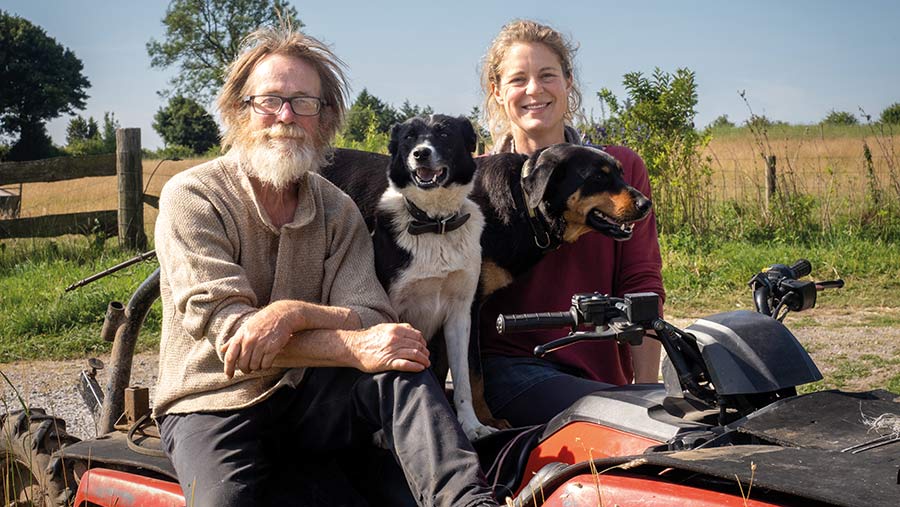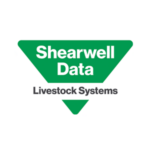Farmers Weekly Awards 2022: Sheep Farmer of the Year
 Andy Wear and Jennifer Hunter © Kathy Horniblow
Andy Wear and Jennifer Hunter © Kathy Horniblow Andrew Wear and Jennifer Hunter Fernhill Farm, Compton Martin, Somerset have won Farmers Weekly’s Sheep Farmer of the Year.
Andrew and Jennifer share a great commercial mindset, which has enabled them to create a sustainable sheep farming enterprise with several additional income channels.
Their flock of lightweight Romney cross Shetland ewes has been bred to thrive on the Mendip Hills as part of a grass-based rotational system with minimal input.
The farm follows regenerative practices and doesn’t use any herbicides, fungicides or fertilisers – which has, in turn, helped keep on-farm costs down.
See also: Farmers Weekly Awards 2022: Sheep Farmer of Year finalists
“Our business is assisted by always knowing what the input costs are, from putting fuel in the truck to paying the labour and rent for the ground, so it’s a known cost system all the time,” says Andrew.
The sheep enterprise consists of 750 breeding ewes owned and an organic flock of 500 ewes in a share-farming agreement.
Farm facts
- Regenerative farming system with A Greener World accreditation
- All sheep are blade sheared prior to lambing
- 1,250 ewes in total including share-farming agreement
- Lambs sold as hoggets at auction markets and plans for direct sales through meat-vending machine
- On-farm events and shearing diversification
Sales of raw fleeces and processed wool account for 40% of the business’s total income from the sheep enterprise.
Good wool genetics are part of the selection criteria when choosing breeding stock, with the farm aiming for lustre longwool fleeces averaging between 10 and 25cm in length.
The farm has invested in a Fibrelux wool micron meter, which is able to test the thickness and micron levels in the fleeces.
The wool is sold at a significant premium, with fleeces achieving an average of £2/kg for standard wool and up to £20/kg for best quality wool.
Fernhill Farm also offers accommodation through an eco-site and hosts blade-shearing competitions and workshops teaching others to shear by hand, which creates an additional source of income.
Flock management
The Romney cross Shetland is a lightweight ewe, averaging just 55kg. Despite their small stature, the ewes are still able to achieve an average scanning rate of 165% and a rearing percentage of more than 150%.
Andrew says: “We used to lamb indoors and there were so many more factors involved, so we spoke to a few farmers who were already lambing outside. We made the move to lambing everything outside in paddocks and moved it back a month.
“The ewes are doing what they are supposed to be doing and getting on with lambing and it is no more difficult assessing them and intervening when you need to than before.”
The ewes are all rotationally grazed and are typically moved every three days, which allows the ground to recover and not be grazed too tightly, reducing the risk of worms.
They use electronic identification to monitor daily liveweight gains in the lambs, which are sold when they reach the target liveweight of 38-42kg, typically between December and April.
The farm makes use of cover crops for outwintering, a cheaper alternative to high feed costs.
Sward mixes are also direct drilled with legumes, providing a high nutrient diet for ewes and helping to improve soil structure.
Marketing
Fernhill Farm sells ewes with lambs at foot through online livestock marketing platform Sell My Livestock.
Most lambs are sold as hoggets through local auction markets, but there are plans to increase direct selling in the future.
Winning ways
- Great knowledge and focus on wool genetics achieving high premiums for fleece sales
- Running a low-input grass-fed flock which reduces business overheads
- Working efficiently with landlords and stakeholders to run a fully integrated rotational grazing system
- Innovative approach to regenerative farming practices.
A word from our independent judge
“What impressed me about Andrew and Jen was their passion for all elements of their business and the health of their farm. Plus, they were keen to share their knowledge with a range of people from farmers, consumers, trainee shearers to festival-goers.”
Liz Genever, independent beef, sheep and forage consultant
The other finalists were:
- Graham Lofthouse, Bankhouse Farm, Stow, Galashiels
- Andrew Phillips, Windsor Farm, Lamphey, Pembrokeshire

